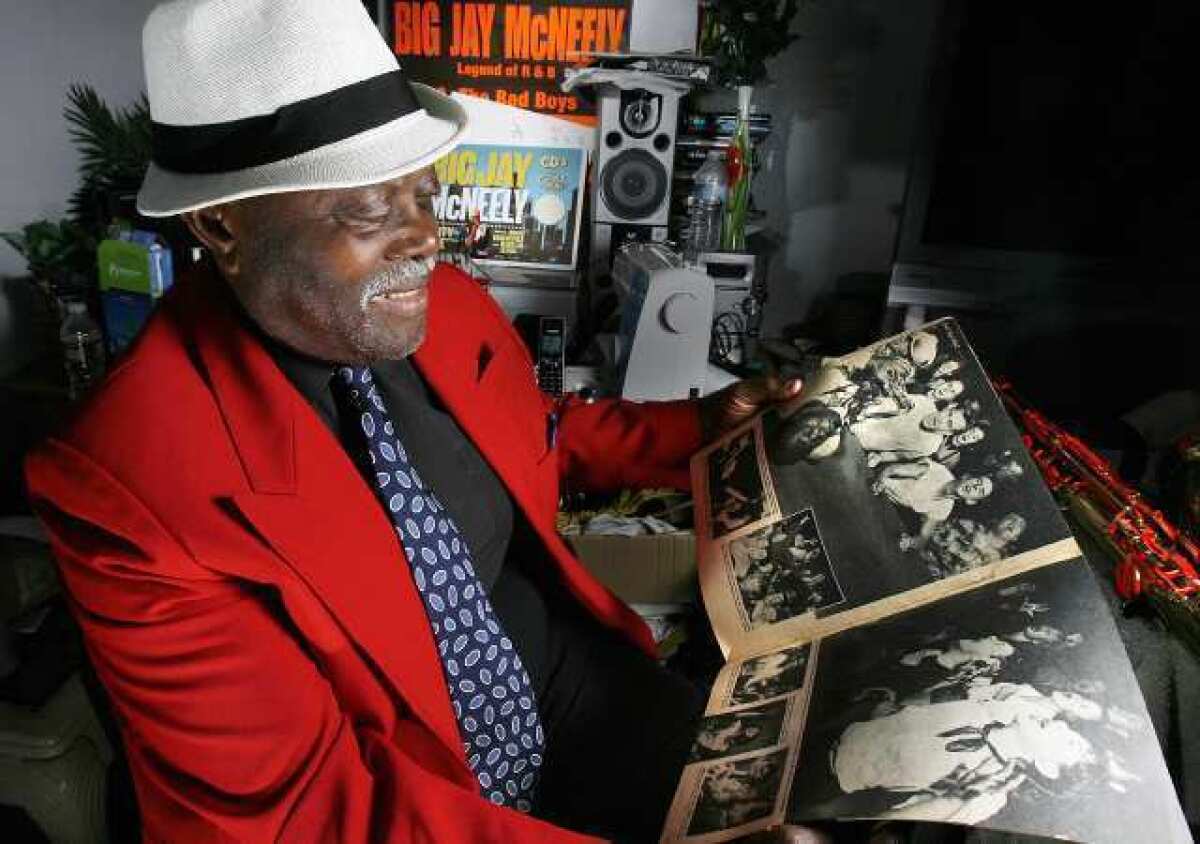Big Jay McNeely still puts on a lively show

Tenor saxophonist Big Jay McNeely has been a musical revolutionary for decades. His first recording, the sinuous, irresistible 1949 instrumental “Deacon’s Hop,” ignited a rhythm-and-blues explosion that heralded and hastened the rise of rock ‘n’ roll.
His volcanic live shows reached frenzy pitch so reliably that within three years he was banned from performing anywhere in Los Angeles County. Almost four decades later, his performance at a Berlin club the same night that the infamous Berlin Wall came down won him a local rep as “the New Joshua.”
More than 60 years into his career, McNeely, who appears at Burbank’s Viva Cantina on Thursday, is still exhibiting a radical artistic sensibility. He recently recorded a loopy, funky electronic-techno set and has an ongoing collaboration with a young Afro-beat collective in the Netherlands. McNeely may be 85 years old, but he simply enjoys what he does too much to ever consider retirement.
A trailblazer in Los Angeles’ profoundly influential post-war R&B; community, McNeely’s early discs remain definitive, epochal statements, so much so that three of them will be featured on the soundtrack of forthcoming Warner Bros. Mickey Cohen bio-pic “Gangster Squad.”
As potent a show stopper as ever — famed for going off stage and walking through the club or outside onto the street, playing while stretched out flat on his back — McNeely still gives out with the dynamic, swinging style, full, rich sax tone and swaggering presentation that has him in demand as a busy live attraction around the world.
“I’m doing quite a bit of stuff these days.” McNeely said. “Got this thing called ‘Mac’s Back’ with [the Engenius.] He’s a young kid, and I just play my horn and he puts the arrangements on it. It’s totally different from what I usually do. It’s for young kids that like all that new stuff. It’s something else, not jazz, not funk, not rock, but a lot of electronic sounds and rhythms.
“I recorded in Germany with a band that’s good at that rockabilly-type stuff, did the African Groove sound with a young group in Amsterdam, and I’m going to Europe in October to promote both of those,” he adds. “After that, I’ll be in Japan for 10 days, doing a thing called ‘The Mellow Sounds of Big Jay’ with this Japanese kid. Then I’m going to play some shows in Australia in December, and I’ll come back for another of those big Art Laboe shows. You remember Art, the radio DJ? We just did that ‘Rock, Race, and Radio’ panel discussion at the Grammy Museum back in May.”
McNeely is as much a significant socio-cultural force as an artistic one. The mid-‘50s ban on his Los Angeles shows, enforced by LAPD and L.A. County sheriffs, were due in part to the fact that McNeely drew huge mixed-race crowds — Pachuco rockers, African American R&B; fans and the wild white kids who helped bring the rock ‘n’ roll craze to America’s airwaves and sales charts. And while there were never any race conflicts at McNeely’s concerts, the very idea of his diverse audience commingling made the powers that be very uncomfortable.
He always looks to the future. “I’ve got a book I want to write — well, two books, one on music and one on my life — there’s a lot of stories nobody’s heard yet. And we’re working on the documentary. The guy, Adam Hyman, has shot a lot of good stuff here, and also with me in Europe. And I’m looking forward to the Viva show, because I don’t do that much live stuff locally anymore.”
McNeely is also acutely aware that, with the recent deaths of Etta James and Johnny Otis, he has outlived almost all of his peers. “I’m the only one right now that’s still kicking. Joe Houston’s still here, but he’s not working. Everybody else is gone, man. I’m trying to hang on in there because I don’t know how much longer I’m gonna hang around. I want to keep things cookin’ while I can.”
JONNY WHITESIDE is a veteran music journalist based in Burbank and author of “Ramblin’ Rose: the Life & Career of Rose Maddox” and “Cry: the Johnnie Ray Story.”
---
Big Jay McNeely
Where: Viva Cantina, 900 W. Riverside Drive, Burbank. Admission is free.
When: Thursday, 9 p.m.
Info: (818) 845-2425; vivacantina.com